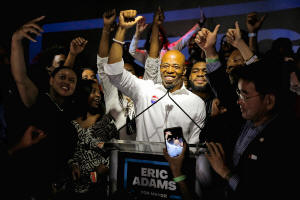Adams leads, Yang concedes, but outcome uncertain in New York City
mayoral primary
 Send a link to a friend
Send a link to a friend
 [June 23, 2021]
By Joseph Ax and Jonathan Allen [June 23, 2021]
By Joseph Ax and Jonathan Allen
NEW YORK (Reuters) -Brooklyn Borough
President Eric Adams, a former police captain who put public safety at
the center of his campaign for New York City mayor, was leading a field
of 13 Democratic candidates in Tuesday's primary election, though the
outcome likely won't be known for weeks.
With 90% of the in-person votes counted, Adams had been picked as the
top choice on 31% of ballots. But with at least 87,000 absentee ballots
yet to be processed, and a new ranked-choice voting system in place,
final results are not expected until mid-July at the earliest.
In remarks to supporters, Adams acknowledged the campaign was far from
over.
"But there's something else we know: that New York City said 'Our first
choice is Eric Adams'," he said.

The winner of Tuesday's Democratic contest to succeed term-limited Mayor
Bill de Blasio will be an overwhelming favorite in November's general
election, given the city's heavily Democratic lean.
Tuesday's totals were enough to force a concession from former
presidential candidate Andrew Yang, who was in a distant fourth place.
Speaking to supporters less than two hours after polls closed, Yang, an
entrepreneur whose surprisingly durable presidential run made him a
national figure, said the vote count made it clear he could not prevail.
"I am a numbers guy," said Yang, once seen as the front-runner. "And I
am not going to be the next mayor of New York City based on upon the
numbers that have come in tonight."
The race appeared to have narrowed to a trio of candidates, all vying
for the chance to lead the country's most populous city in its arduous
recovery from the coronavirus pandemic. Maya Wiley, the former MSNBC
analyst and civil rights lawyer who emerged as the leading liberal
candidate, was in second place with 22%. Kathryn Garcia, a former
sanitation chief who campaigned as an experienced technocrat, was at
20%.
The primary contest is the city's first mayoral campaign to use
ranked-choice voting, in which voters can rank up to five candidates in
order of preference.
Tuesday's results only reflected the top choices for voters who cast
ballots in person.
Voters also were choosing among eight Democratic candidates seeking to
replace retiring Manhattan District Attorney Cyrus Vance Jr. The
nominee, who will be all but guaranteed to win November's general
election, would inherit Vance's criminal probe into former President
Donald Trump's business empire.
The next mayor will confront deep challenges, including wealth
inequality, police accountability, a lack of affordable housing and a
struggling tourism industry.
The unusually fluid campaign was dominated by the issue of crime, as the
city confronts a surge in shootings amid an ongoing national debate over
policing. The election's outcome could help show where Democratic voters
stand on the topic ahead of the 2022 midterm elections.
The leading moderate candidates - Adams, Garcia and Yang - all called
for increased police resources.
[to top of second column]
|

Eric Adams speaks at a New York City primary mayoral election night
party in New York City, U.S., June 22, 2021. REUTERS/Andrew Kelly

Wiley, by contrast, proposed cutting $1 billion from
the nearly $6 billion New York police budget, redirecting the
funding instead to other services, such as mental health counseling.
Any of the top three candidates would make history:
Adams as the city's second Black mayor, Garcia as the first female
mayor and Wiley as the first Black female mayor.
Curtis Sliwa, the founder of the Guardian Angels civilian patrol
group, appeared to have won the Republican primary against
businessman Fernando Mateo.
DELAYED RESULTS
The new system of ranked-choice voting operates as a series of
instant runoffs. With no candidate exceeding 50% among first-choice
ballots, the candidate in last place will be eliminated, and his or
her votes redistributed to the voters' second choices.
The process will repeat until there are only two candidates left,
and the winner is the one with a majority of ballots.
The Board of Elections intends to announce the first round of
ranked-choice results from its tabulation of in-person votes on June
29 and plans to release a second round that includes some absentee
ballots a week later. Final results are expected the week of July
12, after the deadline for voters to fix, or "cure," deficient
ballots has passed.
At a polling station in Brooklyn's Fort Greene neighborhood, voters
generally welcomed the new system, though some conceded they felt
pressure to do more homework than usual to reach five choices.

"Once you sit and down and read everything, then it's actually
pretty easy," said Meg Vasu, a 30-year-old attorney.
She ranked Wiley first after coming away impressed by her
performance in the mayoral debates.
"I felt that she was the best progressive choice," Vasu said.
Michael Hartman, a 41-year-old lawyer, said he ranked Garcia first,
in part based on endorsements by the New York Times and the New York
Daily News.
"I think she is the most competent candidate," he said. "She has
tremendous depth of experience."
Like some other voters, he approached his ballot strategically,
ranking Wiley but leaving off Adams and Yang, whom he disliked as
candidates.
(Reporting by Joseph Ax and Jonathan AllenEditing by Colleen
Jenkins, Aurora Ellis, Jonathan Oatis and Raju Gopalakrishnan)
[© 2021 Thomson Reuters. All rights
reserved.] Copyright 2021 Reuters. All rights reserved. This material may not be published,
broadcast, rewritten or redistributed.
Thompson Reuters is solely responsible for this content. |